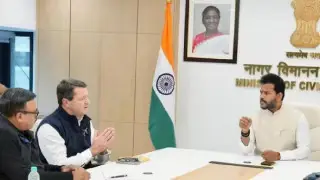
X
As India gears up for the Union Budget 2024-25, set to be presented by Union Finance Minister Nirmala Sitharaman on February 1, it's essential to understand the intricate process involved in preparing and presenting the annual financial statement.
The Union Budget serves as a comprehensive financial document outlining the government's estimated receipts and expenditures for a specific fiscal year. The fiscal year in India runs from April 1 to March 31, and the budget is allocated for the upcoming fiscal year. The presentation of the budget holds immense significance as it sets the financial direction for the government.
Given that general elections for the Lok Sabha are due early next year, the upcoming presentation on February 1 will be an interim Budget. The full Budget for the financial year 2024-25 will be presented after the formation of the new government following the general elections.
As #InterimUnionBudget 2024 is round the corner, let us glance through the major announcements made in past years’ Union Budgets and how the Government endeavours to fulfil those announcements. #PromisesDelivered
— Ministry of Finance (@FinMinIndia) January 15, 2024
👉 Watch this space for more updates. pic.twitter.com/bG6AfMgf3r
The process of preparing the Union Budget is extensive and begins almost six months before the financial statement is presented in Parliament. The key steps involved in the preparation are as follows:
Circulars Issued by Finance Ministry: The Union Finance Ministry initiates the process by issuing circulars to all ministries, states, union territories, and autonomous entities. These circulars include necessary guidelines and forms for estimating receipts and expenditures for the upcoming financial year.
Review of proposals: The proposals submitted by ministries and entities are received and thoroughly reviewed by top government officials, including the revenue secretary. The Department of Expenditures and Niti Aayog conduct detailed consultations to examine the proposals.
Estimates of revenue and expenditure: After reviewing the proposals, the finance ministry compares the estimates of revenue and expenditure to determine the overall budget deficit. The government consults the Chief Economic Advisor to decide on borrowings required to meet the deficit.
Allocation of the Budget: The Finance Ministry allocates revenue to various ministries and departments based on their proposed expenditure. In case of disagreements, consultations are held with the Union Cabinet or the prime minister.
Pre-Budget consultations: The Finance Ministry conducts pre-budget consultations with various stakeholders, including state representatives, bankers, agriculturists, economists, and trade unions. This helps in understanding demands and recommendations.
Halwa ceremony tradition: A significant tradition leading up to the Union Budget presentation is the 'Halwa Ceremony.' This event, held a few days before the budget presentation, involves preparing a massive kadhai of the popular Indian sweet dessert, halwa. The Finance Minister stirs the kadhai and serves the sweet to officials, marking the official initiation of the 'lock-in' period to prevent leaks until the budget is presented.
On February 1, following approval from the President, the Finance Minister presents the Union Budget in the Lok Sabha. The presentation includes summarizing key points and explaining the rationale behind the proposals. The budget is then laid before both houses of Parliament for discussion and, upon approval, forwarded to the President for the final nod.
Understanding the intricacies of the Union Budget preparation process provides insight into the meticulous planning and considerations that shape India's financial roadmap for the coming fiscal year. The presentation on February 1 will unfold the government's economic vision and priorities for the interim period until the formation of the new government after the elections.













Copyright © 2025 Top Indian News
